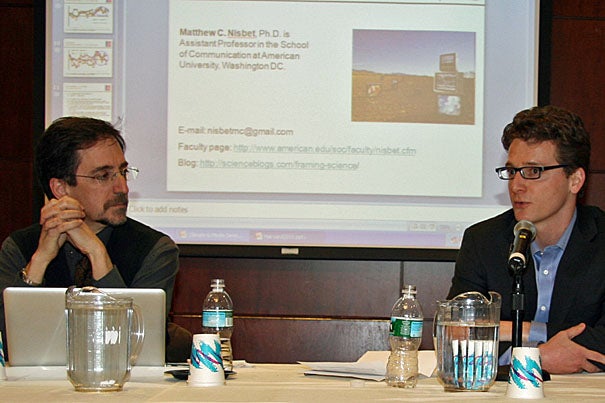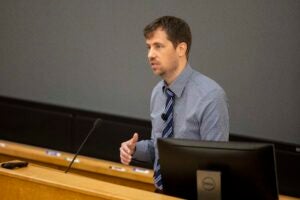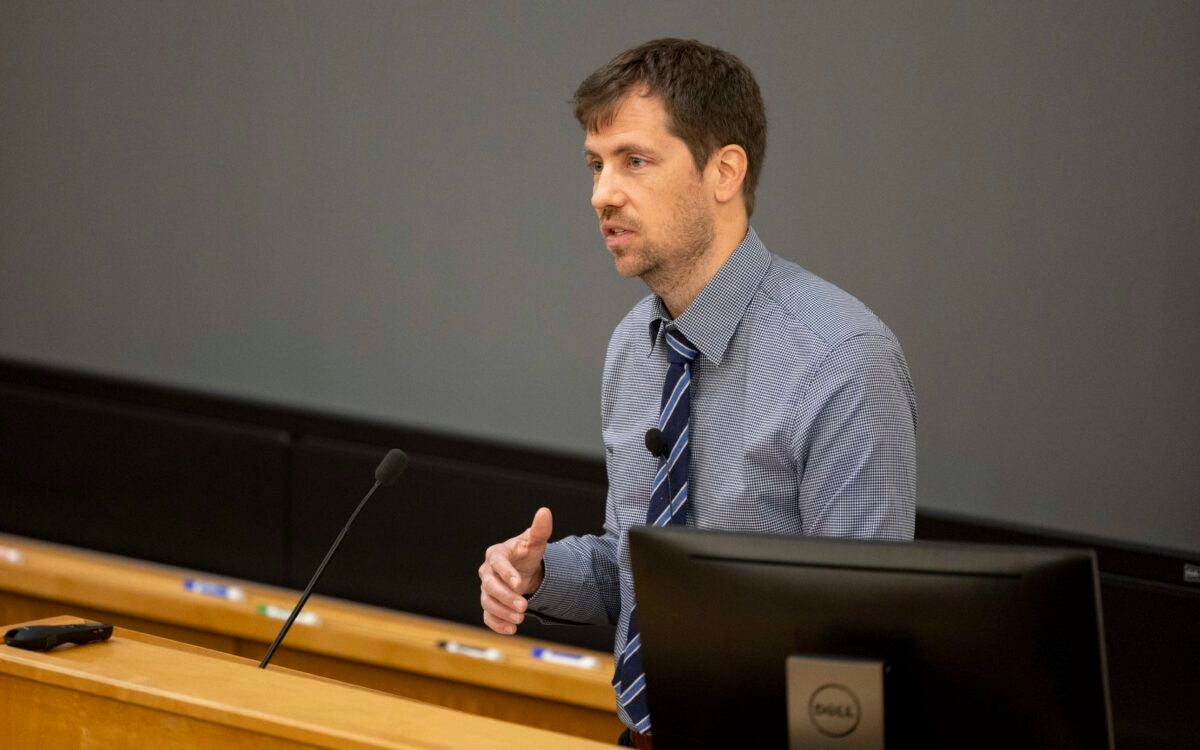
Nisbet and Revkin on climate comm.panel
Sharon Wilke/Belfer Center for Science and International Affairs
Global warnings
Panel says media’s decline undercuts education efforts on climate change
Panelists at the Harvard Kennedy School (HKS) examined two kinds of climate change during the launch of a new seminar series on Thursday (Feb. 4). The first involved global warming. The second concerned another atmospheric shift: the metamorphosis of communications from professional and specialized to public and diffuse, as print gives way to the Internet, and network news to fragmented cable and talk radio.
The seminar, called “The Public Divide Over Climate Change: Scientists, Skeptics & the Media,” was the first of three on press coverage and global warming, and was jointly sponsored by the Belfer Center for Science and International Affairs and the Joan Shorenstein Center on the Press, Politics and Public Policy. It came just after the release of a survey, sponsored by Yale and George Mason universities, that said almost half of Americans are “cautious,” “disengaged,” “doubtful,” or “dismissive” of the idea that climate change exists and is being caused by humankind.
“Media has that nice singular sound,” said moderator Cristine Russell, a senior fellow at the Belfer Center and a freelance journalist. “But it’s obviously a diverse group, many of whom are not interested in news or journalism or facts or information.” The debate on global warming seems chaotic, she said, as seen through the Internet and blogosphere, with “increasingly acrimonious” commentary on the issue from both sides. The task of lessening the chaos is complicated by cutbacks in the mainstream press, the rise of skepticism fueled by conservative pundits, a diverse activist agenda, the concern with politics over policy, and the competition for public attention. One goal of the seminar, Russell added, was to examine how public dialogue might be improved.
Panelist Andrew Revkin has worked toward that goal through his career. “Now we have this instantaneous and intensifying and echo-chamberish concentrating force moving at the speed of light,” said the former New York Times reporter and “Dot Earth” blogger about the Internet, which he contends has helped to intensify the discourse. “What happens is it bounces back and forth within a matter of hours, and then it bounces to Rush Limbaugh or George Will, and then it becomes a really loud message in the political sphere.”
Unfortunately, he added, the message has never been relayed clearly and productively enough to create a groundswell in the general public. “It’s like water in a shallow pan,” Revkin said. “You get a lot of sloshing around, but not a lot of depth.” He said that climate change, which was at the bottom of Americans’ priorities for 2010 in a recent Pew Research Center poll, will not become a top-tier issue in this country, in part because it hasn’t hit close enough to home.
“The history of action on the environment, or any issue, is mainly a function of your direct experience,” he said. Furthermore, cutbacks in traditional media outlets mean that scientists are going to have to work harder to get the message out. “The bottom line is that everyone’s going to have to get more engaged, especially if you care about disinformation. … If you’re not in that soup, no matter how ugly it may be, you’re going to be missing an opportunity to exert some authority and control over the discourse.”
Matthew Nisbet, a social scientist and assistant professor of communication at American University in Washington, D.C., agreed, adding that while skeptics of climate change continue to allege “the uncertainty of the science and the devastating economic consequences of policy action, they are also promoting a relatively new focus on the public accountability of scientists and their institutions.” This narrative, he said, “defines climate change as fundamentally about alleged wrongdoing, politicization, and a cover-up on the part of mainstream scientists.”
Recent surveys, he added, confirm that public concern about and acceptance of climate change have dipped across the political spectrum. One solution, he emphasized, is for scientists to become more focused on public engagement while considering the greater need for transparency and public access to their research, as well as their own political biases (55 percent of scientists self-identify as liberals, he said, while only 20 percent of the public does).
Another tack is for scientists and the press to communicate the dimensions of climate change in a way that people can digest. Framing the storyline around public health and national security, for example, is likely to bring about a shift in public opinion as the topic becomes more personally relevant to a larger portion of the population.
Finally, he said, emphasizing the positive — discussing mitigation efforts rather than simply presenting a doom-and-gloom scenario — may elevate concern. In one survey, he said, “When change was talked about in terms of solutions, people’s positive reactions went way up,” even among the respondents identified as “dismissive.”
The Shorenstein Center’s Thomas Patterson, Bradlee Professor of Government and the Press at Harvard Kennedy School, spoke from a social scientist’s perspective. He cited polling research done just after World War II showing that a determined effort on government’s part to inform the public usually results in “very little change in public opinion,” in part because there is too much competition among various messages.
The level of public understanding on a topic is “sometimes shockingly low,” he said, citing studies taken before the Iraq War that said most Americans believed that Iraqi leader Saddam Hussein and al Qaeda were allies, and more recent polls on health care saying that only 26 percent of Americans know how many votes it takes to break a Senate filibuster. (The filibuster question offered four possible answers, making the number of people who got it correct “almost random.”)
He said another recent survey reported nearly half of the respondents did not believe global warming was happening, or they weren’t sure, or it was caused by something besides human activity. “We can ask the media to do better reporting,” he said, “but this is a monumental task.”
The series continues on March 4 with “Climate Policy and Politics: Covering Conflict in the Capitol, Copenhagen and Beyond” and on March 31 with “Techno-Optimism or Pessimism: ‘Fixing’ the Planet’s Climate Problems.” For more information.




